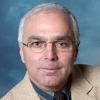
A Baltimore firefighter fights a fire at a convenience store and residence April 28 during clashes in response to the death of Freddie Gray. (CNS/Reuters/Eric Thayer)
"The God of peace is never glorified by human violence," wrote the famous Trappist monk Thomas Merton.
Whether it's on an individual, city, national or international level, violence always dishonors God and makes bad situations worse. The recent Baltimore City riots were no exception: People were injured, neighborhood stores were burned, and violence was further engrained into a city and world already steeped in violence.
But (and this is a big but): What are the reasons that led to violence? What motivated some African-Americans in Baltimore to riot? To ask and to try to answer these questions -- in dialogue with the rioters -- is certainly not meant to justify the violence; rather, it is a necessary step on the road to ending it.
"A riot is the language of the unheard," the Rev. Martin Luther King Jr. said.
I grew up in Baltimore. And in the 1950s and 1960s, when I was a kid, Baltimore -- while it certainly had significant problems like racial segregation -- overall was a kinder and gentler place to live.
In those days, crime was much lower, there were no gangs to speak of, drugs were far less a problem, schools were good, neighbors watched out for each other's children, and blue-collar Baltimore had lots of good manufacturing jobs -- like those provided by Bethlehem Steel -- that offered hard-working people of all colors a living wage.
Sadly, those days are mostly gone.
I spoke with Brendan Walsh, who with his wife, Willa, co-founded Viva House, the Catholic Worker house serving homeless, poor people located in southwest Baltimore, where some of the rioting occurred.
Walsh, who has lived at Viva House since 1968, shared with me his reflections regarding causes of the rioting that occurred after the death of Freddie Gray, who died from a fatal injury that happened while in transport by Baltimore police, according to an initial investigation.
Walsh noted that many U.S. corporations have moved their operations from cities like Baltimore to very poor countries, where they can get away with the injustice of slave labor, and in the process have left many Americans without decent-paying manufacturing jobs.
"What are people to do when there are so few blue-collar jobs available that pay a living wage?" Walsh asked.
Walsh said he believes that every city police officer should be required to live in the city. He said this would help police to better understand the difficulties faced by many city residents, and in the process, better relationships would be established.
Walsh noted there are not nearly enough drug treatment facilities. He said people need to be medically treated for drug addiction, not thrown into prison.
Many years ago, I remember police districts in Baltimore running recreational centers where kids could go to play sports and games and to do homework with police officers, who offered guidance and friendship.
Back in those days, numerous companies offered students summer jobs. For a couple of summers, I worked for Baltimore Gas and Electric in their machine shop.
We need to bring back the recreational centers and summer jobs.
Federal, state and city governments, in partnership with corporations, need to create a comprehensive, well-funded plan to rebuild our cities.
Baltimore's Catholic Archbishop William Lori perhaps said it best: "For without love, respect, and personal relationships, our lives make no sense. We shouldn't expect a person whose life makes no sense to pull himself up by his bootstraps into a productive and prosperous life."
[Tony Magliano is an internationally syndicated social justice and peace columnist. He is available to speak at diocesan or parish gatherings about Catholic social teaching. His keynote address, "Advancing the Kingdom of God in the 21st Century," has been well received by diocesan gatherings from San Clemente, Calif., to Baltimore. Tony can be reached at tmag@zoominternet.net.]
Editor's note: We can send you an email alert every time Tony Magliano's column, "Making a Difference," is posted. Go to this page and follow directions: Email alert sign-up.



